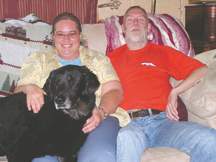Grand Junction Free Press
Grand Junction couple learns to live with Huntington's disease
 |
Inside their home, Rebecca Lampton sits next to her husband, Scott, who has Huntington’s disease.
|
|
GRAND JUNCTION, Colo. — When Rebecca and Scott Lampton married 10 years ago, he was already exhibiting involuntary movements and twitching, but Rebecca, 44, said she thought it was simply muscle twitches. After the jerky movements progressed she thought it was Tourette syndrome, an inherited disorder of the nervous system characterized by unwanted movements and noises. Scott said he thought his symptoms were the result of being hit in the head at least 10 times playing baseball or softball. After Marillac Clinic referred the couple to neurologist Joel Dean last June, the 45-year-old Scott was diagnosed with Huntington’s disease — a neurological, familial disease passed from parent to child. Huntington’s disease causes degeneration of brain cells, resulting in the loss of ability to walk, think, reason and swallow. “We’d never heard of it before,” Rebecca said. Yet she was relieved to have a diagnosis, she said. “We know what it is now. We know what we’re up against,” Rebecca said. Scott’s torso and arms jerk almost continuously, but he can still read by laying a book on the table. He engages in conversation and talks clearly, although Rebecca said she’s noticed small changes in his cognitive abilities over time. Unable to work, and confined mostly to home, Scott passes the time by walking their dog, reading and watching television. “I don’t do e-mails anymore. I can’t type anymore,” Scott said. It’s difficult to hold the phone and his chin sometimes accidentally hits various keys, making it hard to talk on the phone. Scott is also starting to have difficulty swallowing. “I eat slow, take small bites, and chew it fast,” Scott said. Rebecca works several part-time jobs — as a substitute teacher’s aide, a notary and home refinancer. She also recently took a temporary job at Home Depot. “It can be difficult at times,” Rebecca said. “He can’t help financially — it’s all up to me on that one. And he feels bad I’m working all these jobs.” Before his diagnosis Scott had worked at Frame Depot for 10 years and in the circulation department of a local newspaper for three years. Children of a parent with Huntington’s disease have a 50-50 chance of inheriting the gene that causes the disease. Scott wouldn’t have known he was susceptible because he was adopted, and his adoptive parents either didn’t know or didn’t disclose his biological family’s medical history. His adoptive mother died in 2001 before Scott was diagnosed with the disease. The couple doesn’t have to worry about Rebecca’s son Wesley inheriting Huntington’s disease, because he was born of Rebecca’s first husband. After Scott’s diagnosis, Rebecca researched online and found a Huntington’s disease support group in Grand Junction that meets the final Tuesday of each month from 6:30 to 8 p.m. at the First United Methodist Church, 522 White Ave. There they’ve met others who are coping with the disease. Pablo Perea, who’s wife Connie was profiled in the Free Press two years ago, attends the monthly meetings. Connie died last year at age 44 from Huntington’s disease, and now their daughter Amanda, a mother of three children, has been diagnosed with the disease. Onset of Huntington’s generally occurs mid-life, although it can occur in youths or seniors. A person with the disease becomes totally dependent on others. A genetic test has been available since 1993 to determine whether or not a person carries the gene. About one in 10,000 Americans have the disease. Legendary folk singer Woody Guthrie died from Hungtington’s disease in 1967. Rebecca’s father is helping to install hand rails at their Grand Junction home just north of Orchard Avenue. There will be other adjustments down the road. “It can get tough at times,” Rebecca said. “How I’m going to handle it, I have no idea yet.” Reach Sharon Sullivan at ssullivan@gjfreepress.com. |
Site created by Jennifer Hickok
